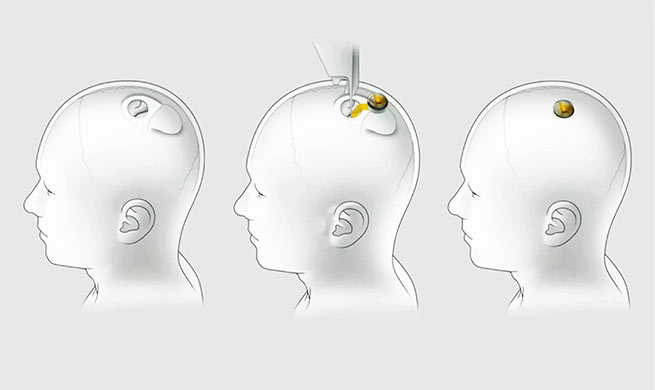Neuralink is developing an interface that can be surgically implanted into the brain for medical applications in previously incurable cases such as paraplegia or dementia.
Neuralink, Elon Musk’s brain implant company, has received approval for the first human clinical trial from the US regulatory authority. The US Food and Drug Administration approval marks an important milestone for the company.
“We are pleased to announce that we have received FDA approval for our first human clinical trial,” Neuralink announced on Twitter, calling the development “an important step that will one day enable our technology to help many people.”
Elon Musk retweeted the post, congratulating his team.
Congratulations Neuralink team! https://t.co/AWZGf33UDr
— Elon Musk (@elonmusk) May 26, 2023
We are pleased to announce that we have received FDA approval to launch our first human clinical trial! This is the result of the incredible work of the Neuralink team in close collaboration with the FDA and represents an important first step that will one day allow…
We are excited to share that we have received the FDA’s approval to launch our first-in-human clinical study!
This is the result of incredible work by the Neuralink team in close collaboration with the FDA and represents an important first step that will one day allow our…
— Neuralink (@neuralink) May 25, 2023
The company has developed a device that is robotically implanted in the brain, deciphering brain activity and connecting it to computers. So far, Neuralink has only conducted animal studies.
Who are Neuralink
Neuralink, founded in 2016 and headquartered in San Francisco, California and Austin, Texas, has over 400 employees. She is developing an interface that can be surgically implanted into the brain for medical use to treat hitherto incurable cases. This interface is based on a Neuralink device with a chip that processes and transmits neural signals that can be transmitted to devices such as a computer or smartphone. The company now hopes that a person will be able to control the mouse, keyboard, or other computer functions, such as text messages, through their thoughts.
The main goal is to develop an electronic brain implant that, if appropriately adjusted each time, will allow various medical innovations, such as making people with paraplegia walk and communicate again, restore vision to visually impaired people, and treat people with dementia. , Alzheimer’s and Parkinson’s disease.
The first product that Neuralink will create will allow a person with paralysis to use a smartphone with the power of thought and faster than someone who uses the index finger, ”Elon Musk said in April last year. Its long-term goals are to combine the human brain with artificial intelligence.
It is noted that the rival company Synchron seems to be ahead of the development of Neuralink, as it implanted the chip in a patient in the United States in July 2022, and also tested it on four residents of Australia.
A hole the size of a coin is cut into the skull, and a chip is inserted into it.
Consciousness or soul
Until now, no one knows exactly what our soul is, where it is and how it exists. How do we feel grief or love, why do we experience the same emotions in memories as before, writes Yaroslav Nivkin.
For science, there is no such term as the soul, for it there is consciousness, personality. And this consciousness acts only when the body, or rather, the brain, is functioning. For scientists, thoughts, memories, and even emotions are just a series of electrical signals in the brain. It is this concept that Elon Musk and Neurolink engineers adhere to.
Elon Musk: “Everything you feel, feel, hear, think is all an action potential, just bursts of electrical activity.”
That is, for Elon Musk, our entire consciousness, our entire personality is nothing more than a special set of electrical impulses. And if the brain is damaged, consciousness is also damaged.
Elon Musk: “If you somehow damage the brain, physically, then the consciousness will also be damaged. It follows from this that consciousness is a physical aspect.
But there are many facts that claim that everything is much more complicated.
saint Luka Voyno-Yasenetsky was an excellent surgeon and often performed operations on the human brain. He came across cases when a part of the brain simply was not there, but this did not affect the work of consciousness in any way: “I opened a huge abscess in a young wounded man, which destroyed the entire left frontal lobe, and I did not observe any mental defects after this operation. Another patient had a huge cyst of the meninges. With a wide opening of the skull, I was surprised to see that almost the entire right half of it was empty, the entire hemisphere was squeezed almost to the point of impossibility to distinguish it.
In France, in 2007, a 44-year-old civil servant went to the hospital. When they did an MRI of his skull, it turned out that there was practically no brain there, the skull was empty. In infancy, he had hydrocephalus, fluid accumulated in his head and pressed on the brain, preventing it from growing. The fluid was pumped out, but the brain never grew. However, this did not affect the thinking in any way.
In 1980, neurologist John Lorber wrote about a similar case. A mathematician with an IQ of 127 had a brain 75% smaller than normal. And Lorber had more than 600 such patients. Where do such people store their memories, how do they think? Where do they put the chip?
What then will people with a chip get? Surely all the conveniences that modern smartphones have – video, music, games, social networks, and so on, but on a new level – without a display and headphones, right into the brain.
Elon Musk: “He is capable of a lot, as if your phone was installed in your brain. An application will be installed on the phone, and the link (chip – Ed.) in your head will connect via bluetooth.
With a chip, a person will be able to drive a car with artificial intelligence, connect to bank terminals, make purchases online, and so on. Comfortable? Very. But what do you pay for it? After all, the device not only reads the signals of the brain, but also affects it.
The famous neuroscientist Mikhail Lebedev, whose student Elon Musk was, claims: “It is possible to implant electrodes in the zones that are responsible for human motivation, for pleasure, and get as a result of a controlled guinea pig. A soldier who receives the command “forward” and obediently runs forward.
Elon Musk expects that access to the chip from the outside will be only with the consent of the owner, but he is not completely sure about this
Elon Musk: “Tim (an employee of Neurolink – Ed.) Thought I said “consensual telepathy”, and I said conceptual telepathy. We assume that it will be by mutual agreement. Nobody wants people to just crawl into your brain without permission.”
Is this the chip that John the Evangelist warned about?
In a conversation about a chip, one cannot avoid mentioning the words from the revelation of St. John the Theologian: “He (the false prophet of the Antichrist) will make sure that everyone, small and great, rich and poor, free and slaves, will have a mark on their right hand, or on their forehead and that no one will be able to buy or sell, except he who has this mark, or the name of the beast, or the number of his name” (Revelation 13:16).
In Sweden, a chip has been implanted in the hand for several years. It allows you to store information about the owner, work as an electronic key, replace a ticket on a train, and conduct banking operations. Many say the chip will soon replace cash and replace everything. This is convenient for those who accept it and very inconvenient for those who do not want to do this for some reason. For example, believers.
It is easy to guess that Elon Musk’s chip, if widely used, will become for the owner a replacement for all modern means of communication and communication with the world. Many scientists note the dependence of modern man on electronic gadgets, or rather, the virtual world, the conductor to which are computers, tablets and smartphones. More and more people spend their free time there. We are here with the body, but our consciousness and even our heart are in the network, it is already stupid to deny this now. And how the words of the Savior already sound in a new way: “Where your treasure is, there your heart will be also” (Matthew 6:19-21).
Now, no matter how hard it is sometimes to break away from the gadget, we still have the freedom and opportunity to do it. At any time, the phone can be postponed, turned off. We can be left alone with our thoughts at any moment, and no one can penetrate there. But what will happen if our consciousness becomes part of a huge virtual world? What will happen to our soul if we are constantly online without the right to disconnect, comprehend our thoughts, actions, sins? Will a person with a chip be able to isolate himself from this world and go into prayer?







More Stories
Stress: the most stressful time of the day
Is it possible to eat pizza left on the table the night before?
Study: Can Avocados Really Make You Fat?